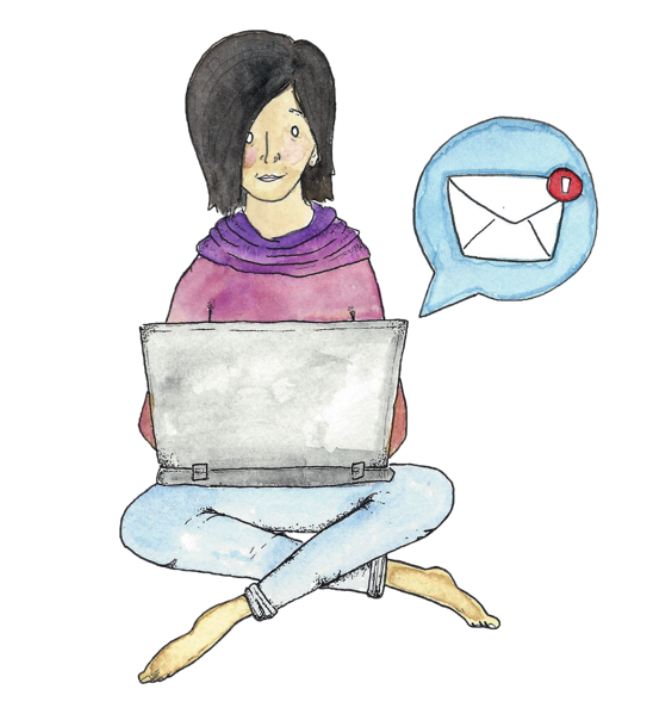The honeyed swells of Paul McCartney’s voice reverberate through her mind in toe-tapping melodies. She sits contemplatively in front of the Tumblr signup screen that demands a username, an identity to append to a formless soul. All the while, she is swept away in a fit of nostalgia as she remembers the song of her childhood. A song before the growing pangs of adolescent alienation and angst. A song before unforeseen emotional breakdowns and self-destructive splendour. A song before the diagnoses of obsessive-compulsive disorder, borderline personality disorder, and social anxiety. Her eyes brim with tears, and her hands hover above the keyboard, shaking. Then, the voice of days passed whispers to her, “Take a sad song and make it better.” She wipes the tears from her eyes and types the name: asking-jude.
She doesn’t think much of it in the beginning. It is just another blog hoping for recognizance among the hundreds of thousands hoping for the same thing. It is just another digital diary for her to express the pent-up feelings so unintelligible to her in her young age. She has no idea that this blog will become a mental and emotional safe haven for over 16,000 souls equally as shattered as hers. She will become the friend and listener she needed during her youth. And, this will save her.
I founded Asking Jude in 2013 with the meagre hopes of creating an online community, where I could express myself and allow others to do the same. However, as the popularity for the site grew, I discovered I was not alone. As time passed, I would receive more and more questions from followers struggling with the same problems I faced. Individuals, ignored and anonymous, starving to be recognized and listened to. This opened new doors of perception that I had yet conceived of. As I sought to answer each question through guidance and encouragement, I found that I was able to step outside myself and my problems for the first time. By working as a problem-solver for strangers, I was able to solve the problems within my life in a healthier, more objective manner. I discovered that by helping others, I was able to help myself for the first time.
The idea that helping others can hold a therapeutic value to helpers or volunteers is not a new one. In 1965, Frank Riessman published an article that outlined a new psychological principle in the journal Social Work. Coining the term the “helper therapy principle,” he claimed that helping others gives specific benefits for those who are helping, such as improved self-image, learning through teaching others, and so on (Riessman). Since this influential publication, subsequent treatments have been conducted by scholars and clinicians alike to alleviate individuals with wide-ranging mental health issues.
According to a 2016 study conducted by leading researchers Tristen Inagaki and Naomi Eisenburger, fMRI brain imaging on participants found that giving support rather than receiving support affected the brain in a substantially better way. While both giving and receiving support reduced negative psychosocial consequences, those who gave social support received three key neurobiological benefits. These benefits included reduced stress-related activity in the dorsal anterior cingulate cortex, right anterior insula, and right amygdala and greater reward- and caregiving-related activity in the left and right ventral striatum and septal area respectively (Inagaki et al., 443).
These findings suggest that receiving is just as important as giving support to others for our overall well-being and emotional health. By helping others, we are able to feel valuable not only to those we have helped but to the overall community, perpetuating our self-esteem. Helping others also teaches humility, allowing us to understand that we are not the only individuals in the world that face certain issues. Through giving, we are able to understand that life exists outside our own selves, enabling self-awareness and empathy to blossom. As stated by John Bunyan, “You have not lived today until you have done something for someone who can never repay you.”
Whether it is adopting a stray from the local pound or sparing a few cents to a person in need, small acts of kindness are what preserve our humanity. Creating Asking Jude helped me find myself as well as saved me from myself. In all actuality, there is a Jude within us all. All we have to do is simply listen.
Works Cited:
Riessman, Frank. “The ‘helper’ therapy principle.” Social Work, vol. 10, no. 2, pp 27–32.
Inagaki, Tristen, and Naomi Eisenberger. “The Neurobiology of Giving Versus Receiving Support.” Psychosomatic Medicine, vol. 78, no. 4, May 2016, pp. 443-53.


